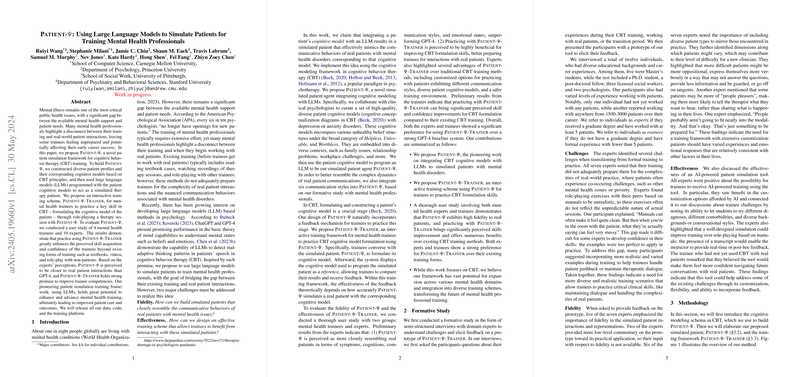Exploring Patient Simulation for Mental Health Training
The research paper titled "Patient-: Using LLMs to Simulate Patients for Training Mental Health Professionals" introduces an innovative approach to addressing the gap between mental health professional training and the complexities of real-world patient interactions. This paper presents a structured framework, Patient-, that leverages LLMs to simulate patient interactions, offering a promising enhancement to traditional cognitive-behavioral therapy (CBT) training.
Technical Overview
The core of this framework is the Patient-, a simulated patient agent constructed by integrating cognitive models grounded in CBT principles with LLMs. The cognitive models are derived from the Cognitive Conceptualization Diagram (CCD), which captures various cognitive components such as core beliefs, automatic thoughts, and emotional responses linked with specific situations. The paper meticulously curates a dataset, featuring 106 diverse patient cognitive models spanning various contexts including family dynamics, workplace stressors, and personal growth challenges.
Patient- is designed to mimic a range of conversational styles observed in real patients, categorized into six types: plain, upset, verbose, reserved, tangent, and pleasing. This classification enhances the fidelity of simulations by mirroring different patient communication patterns, thereby providing trainees with exposure to varied patient interactions.
Evaluative Findings
A prominent feature of the research is its comprehensive user paper involving mental health trainees and experts. The paper evaluates the fidelity of Patient- in simulating real patient interactions and its effectiveness as a training tool. Notably, experts perceive Patient- as considerably closer in fidelity to actual patients compared to a baseline using GPT-4. Patient- is reported to significantly enhance skill acquisition and confidence among trainees, surpassing existing training methods such as textbooks and peer role-playing.
The user paper highlights Patient-'s potential to provide realistic patient interactions, particularly through its varied conversational styles and detailed cognitive models. Both trainees and experts recognize the tool's ability to bridge the gap between theoretical CBT training and the unpredictable nature of live patient interactions.
Implications and Future Directions
The practical implications of this research are substantial. Patient- offers a scalable, customizable platform for mental health training that can be widely deployed to enhance the preparation of mental health professionals. The interactive nature of the training session, coupled with real-time feedback from comparing trainee-formulated cognitive models with the reference models, provides a robust mechanism for skill refinement.
From a theoretical perspective, the successful use of LLMs in simulating complex cognitive interactions opens new avenues for research into the application of AI in psychotherapeutic practices. Future work could explore the extension of this framework to other therapy modalities and the incorporation of multimodal inputs such as audio and visual cues to further increase fidelity.
Conclusion
The development of Patient- marks a significant advancement in the field of mental health training. By integrating LLMs with well-established psychological frameworks, this research offers a nuanced tool capable of enhancing the experiential learning of mental health professionals. It provides a glimpse into the future where AI-driven simulations become a cornerstone of professional healthcare training, ensuring that trainees are better prepared for the diverse and complex challenges presented by real-world clinical practice.
